
A group of people thought to be migrants wade into the sea to board an approaching small boat at Gravelines, France, in an attempt to reach the UK by crossing the English Channel in May earlier this year. Photograph: Gareth Fuller/PA
Show key events only Please turn on JavaScript to use this feature
Live feed
Support for hardline anti-immigration policies linked to ignorance about migration figures, poll suggests
YouGov has released detailed polling on attitudes to immigration that shows a clear link between having hardline anti-immigrant views and being ignorant about the level of illegal immigration into the UK.
It is well known that many people massively over-estimate the extent to which irregular migration contributes to the overall net migration figures, which reached a record high of 900,000 in the year ending June 2023.
The confusion is partly explained by the huge media and political attention given to people arriving illegal in the UK on small boats. But the annual small boat arrival figure has never been higher than the 46,000 total it reached in 2022 – although it is on course to pass that this year.
The YouGov polling suggests that, while cutting migration numbers signifcantly but still allowing some migrants into the country is the policy with most support (very broadly, this is also what Labour and the Tories advocate), almost half of voters either strongly (26%) or somewhat (19%) support “admitting no more new migrants and requiring large numbers of migrants who came to the UK in recent years to leave”.
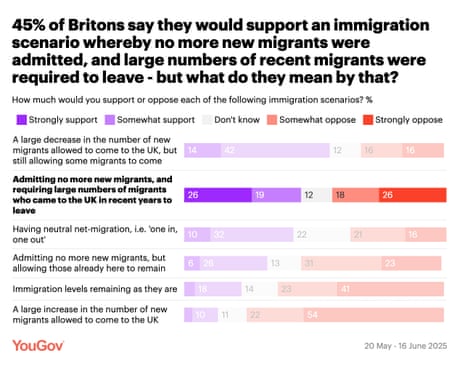
YouGov describes this as “extraordinary”. Advocating for migrants who settled in the UK for years to leave is a policy that has not been supported by anyone in mainstream politics for decade, and even now it is a cause that is principally being championed by people who are unashamedly racist.
But the YouGov polling also found that almost half of respondents thought there were more immigrants staying in the UK illegally than legally, and that only 19% said that there was “much more” legal than illegal immigration (which is almost certainly the correct answer, even allowing for the very highest estimates of the level of unauthorised migration).
And YouGov established that people saying, wrongly, that there is “much more” illegal migration than legal migration are much more likely to be in the group saying large numbers of recent migrants should be returned.
In his write-up of the research, YouGov’s Matthew Smith says:
Almost half of Britons (47%) think there are more migrants staying in the UK illegally rather than legally … [and] crucially, this view is held by 72% of those who want to see mass removals. However, these perceptions appear to be wide of the mark.
Estimates of the population of illegal migrants living in the UK range from 120,000 to 1.3 million, with Reform UK’s Zia Yusuf recently putting the figure at 1.2 million.
Regardless of which figure from this range is chosen, it does not come close to the number of migrants living in the UK legally, with 2021/2022 census data putting the entire foreign-born population of the UK at 10.7 million.
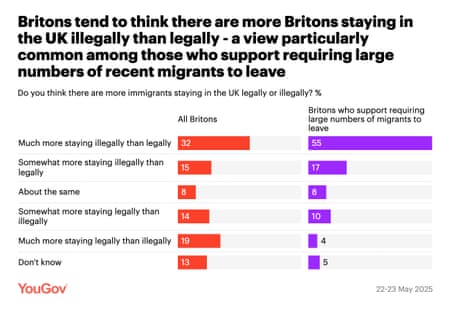
Although ignorance of the numbers is linked to support for hardline anti-immigration policies, YouGov is not arguing that better public understanding would eliminate all concerns about immigration. It points out that, when asked specifically about legal immigration, a plurality of people say it is too high. And a significant minority of people think even legal migrants have not integrated into British society successfully, YouGov says.
Smith says:
While it is clear that legal migration dramatically outweighs illegal migration, that is not to say that if only the public could be made aware of this fact then immigration would disappear as an issue.
After all, Britons tend to think that legal immigration has been too high as well, and the concerns that many people have extend beyond the economic terms in which immigration is typically justified – anyone seeking to address the issue will need to engage with deeper anxieties about identity, integration, and the perceived erosion of shared national values.
In a post on Bluesky, Alan White, editor of PoliticsHome, says this polling is a terrible indictment of the media.
New YouGov polling. A monumental failure of our political class to educate, a monumental failure of our media to report fairly, for a generation
Key events Show key events only Please turn on JavaScript to use this feature
Afternoon summary
Prison bosses will make room for a possible influx of arrested demonstrators this weekend amid concerns that some jails are close to full, the head of the national governors’ body has revealed. As Rajeev Syal and Ben Quinn report, the police have threatened to arrest hundreds of supporters of the banned group Palestine Action, who plan to protest in London this weekend. Yvette Cooper, the home secretary, has defended banning the group. (See 10.32am.)
Kemi Badenoch has called for “full transparency” in what the police tell the public about the ethnicity and immigration status of people arrested for alleged offences. She spoke out as more experts criticised the accuracy of Tory claims that migrants are disproportionately involved in sexual crimes. (See 3.42pm.)
YouGov has published polling figures suggesting a clear link between having hardline anti-immigrant views and being ignorant about the level of illegal immigration into the UK. (See 12.25pm.)
The UK’s dominant service sector has reported its biggest drop in new orders in almost three years in July, adding to pressure on the Bank of England to cut interest rates on Thursday. Commenting on the figures, Andrew Griffith, the shadow business secretary, said:
The confidence of businesses in the service sector – Britain’s largest employers – is falling because Labour are putting Britain’s takers before the makers with more tax hikes in the autumn.
For a full list of all the stories covered on the blog today, do scroll through the list of key event headlines near the top of the blog.
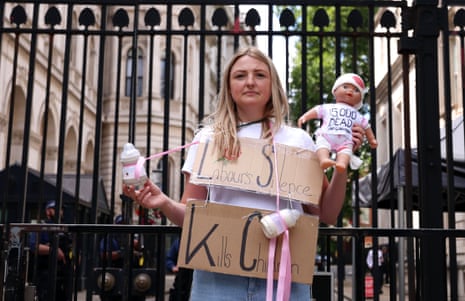
living wage on course for 4.1% increase in 2026, Low Pay Commission says
The government has today published its 2025 remit for the Low Pay Commission. This sets the guidelines for the commission to follow when it makes its recommendations later in the year for the national living wage (the rate for people over the age of 21) and the national minimum wage (the rate for younger workers) in 2026.
In an analysis, the Resolution Foundation thinktank says the government is adopting
It says:
The new remit again states that the government “is determined to deliver a genuine living wage”.
But despite this ambitious language, the government has again opted for a steady-as-she-goes approach to the adult minimum wage rate for 2026, which is set to rise in line with typical earnings next year. This was also the approach taken to the 2025 uprating. Similarly, despite a bold pledge to get rid of minimum wage rates for younger workers (under the age of 21), which the government says are “discriminatory”, worrying economic data means reality may be less spectacular. The government has asked the Low Pay Commission to consult on changes in the rate for 18-to-20 year olds, which suggests the 18-to-20 year old rate is set for a smaller increase in 2026 than the large 16.3 per cent increase this year.
Given current forecasts for wage growth and the government’s policy announced today, the Low Pay Commission have said they currently expect the Living Wage (the NLW – which applies to workers aged 21 and above) to reach £12.71 in April 2016, an increase of 4.1 per cent. This would be a smaller cash increase than all but one year (2021) in the post-2015 Living Wage era.
UKHospitality, the trade body representing the hospitality industry, has urged the commission to be cautious about the rate at which it raises the living wage. Kate Nicholls, its chair, said:
With significant new costs, such as the increase made to employer national insurance contributions, already hitting businesses hard, any significant wage hike may cost jobs. We urge the Low Pay Commission to recognise these cost pressures and recommend a more gradual and sustainable increase this year.
Regrettably, escalating employment costs are already forcing businesses to reduce staff hours and, in some cases, make redundancies. Across the board, the labour market indicators are flashing red, and the Bank of England has also repeatedly voiced concerns about a potential wage-price spiral fuelling inflation. Inflating wages too far, too fast, would be counter-productive, resulting in fewer people earning a little more, but many more facing job losses or reduced hours, ultimately undermining the goal of putting more money in people’s pockets.
Danny Shaw, the former BBC home affairs correspondent who is now a commentator (and who briefly worked for Yvette Cooper as an adviser), has also been looking at the veracity of Robert Jenrick’s claim about asylum seekers being disproportionately likely to be sex offenders. (See 3.42pm.) Like the BBC’s Robert Cuffe, he does not think the figures Jenrick is using are reliable. He has explained why in a thread on social media.
Here are some more pictures from Kemi Badenoch’s visit to a farm in Essex today.
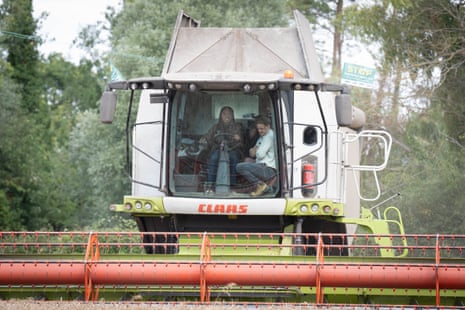
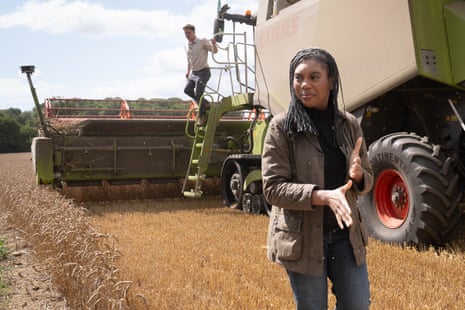

Badenoch calls for 'full transparency' about crime suspects - as Tories criticised over claims linking migrants to sex offences
This morning Yvette Cooper, the home secretary, confirmed that the government is cautiously in favour of getting the police to release more information about the ethnicity or immigration status of people who have been charged. Under current guidance, this morning is not normally released. (See 9.54am.)
Kemi Badenoch told journalists today that she wanted “full transparency” in this area. She said:
We should know the ethnicity and the nationality of suspects, of perpetrators, of victims. There shouldn’t be anything to hide.
People will start losing faith in the justice system, in the police, if they feel that things are being hidden. So I would like to see full transparency as much as possible.
Pressure for the routine release of infomation like this is coming in particular from rightwing politicians, in the Conservative party and Reform UK, who believe that asylum seekers are disproportionately likely to engage in criminal behaviour, particularly sexual offending. This is now official Conservative party thinking, and it is a key Reform UK message, as the party illustrated at a press conference yesterday.
Yet Amnesty UK has warned disclosing information like this after suspects have been arrested could inflame racism. Responding to Cooper’s comments on this, Alba Kapoor, racial justice lead at Amnesty UK said:
The racist riots of last summer show how exactly how focus – true or false – on a suspect’s ethnicity or immigration status can become a lightning rod for racist sentiment.
Yet almost exactly a year on, the government is choosing to pour fuel on the fire of dangerous narratives, instead of taking action to address racism and hostility. Moreover, the release of this data could further amplify entrenched racism in the police service, as outlined in the Met’s recent Casey Report.
There has also been criticism of the statistics cited by the Tories and Reform to justify their concerns on this. Yesterday Robert Jenrick, shadow justice secretary, claimed that foreigners committed 40% of sexual crimes in London last year, despite comprising 25% of the population, and that groups like Afghans and Eritreans were 20 times more likely to commit sexual offences than British nationals.
Speaking on Radio 4 yesterday, Robert Cuffe, head of statistics at the BBC, said the figure relating to crime in London was “probably an exaggeration”. He explained:
The figures come from the Metropolitan police. The Centre for Migration Control got a Freedom of Information request from them, and they do indeed show that 40% of people proceeded against for sexual offences last year were foreign nationals.
“Proceeded against” – that’s charged or cautioned, not necessarily convicted.
So [Jenrick’s] wrong to say it’s 40% of crimes committed.
But there’s a more important caveat to bear in mind. Analyses like these that look at the number of crimes or charges against the share of the population – they’re missing a really important factor – age. Younger men are more likely to commit or be charged for these types of crimes, and foreign nationals are more likely to be young.
So if you did a proper analysis that really took account of those differences, the gaps would look a lot smaller.
I’ve been talking to people in the field who don’t have an axe to grind, and they say of course it’s possible that there’s something here, these just aren’t the data to tell us.
Cuffe said the second claim, about Afghans and Eritreans being 20 times more likely to commit crimes than Britons, was much more problematic.
He explained:
For this one, I think you’re on much, much, much shakier ground, because all of the problems [with the previous figures] apply here, and some more as well.
Foreign nationals are also less likely to show up in the population stats, because, for example, the ONS don’t go to communal establishments like migrant hostels.
That’s not too big a deal if you’re looking at the share of population as a whole. But if you’re looking at just Eritreans, who account for less than 1% of these offences, or Afghans, then those differences become really, really important. If you miss a small number of people, it can have an outsized effect.
So those numbers like 20 times more likely – run a mile from those.
On the blog yesterday I also highlighted a very good Substack analysis by Emma Monk dismantling Tory claims about asylum seekers being disporportionately criminal.
Kemi Badenoch has restated her opposition to Keir Starmer’s plan to recognise Palestinian statehood. Speaking to reporters on a visit to Essex, she said:
Hamas is a terrorist organisation. We should not be creating a new terrorist state. This is basic stuff, and I don’t understand why Keir Starmer doesn’t understand that …
We’ve been seeing images of a hostage who looks like he’s being starved to death, forced to dig his own grave. This is what Hamas is about.
Now is not the time to reward them for their atrocities and for the massacre they committed on October 7 by giving them statehood recognition.
The Green party has joined Jeremy Corbyn in protesting about the prospect of allotments being sold off. (See 1.15pm.) In a statement responding to the story, the Green peer Jenny Jones said:
Allotments are valuable spaces to promote physical and mental health, help with local food security, encourage a gift culture amongst allotment holders and their neighbours, and offer a sanctuary for nature. Labour should know that they are especially important for people who don’t have the privilege of their own garden, i.e. many of those who vote - or used to vote - Labour.
This policy is another sign that Labour knows the price of everything but the value of nothing. Cash-strapped councils need to be offered proper funding by central government, not pushed into selling off these vital community assets.
Badenoch rejects claims Tories are to blame for backlog in asylum system
Kemi Badenoch has rejected claims that the Conservative party is to blame for the backlog in the asylum system.
Ministers regularly claim that they inherited a “broken” asylum system and that one reason why so many asylum seekers are having to be housed in hotels is because the last government stopped processing claims while it focused all its efforts on trying to launch its Rwanda deportation scheme.
But, on a visit in Essex, Badenoch told journalists she did not accept this case. Asked if she accepted that her party was “partly” to blame for the problem, she replied:
No I don’t accept that at all, because what Labour are doing is just rubber-stamping all of the applications and saying they’re processing.
We need to make sure that when people come to our country illegally, they are deported.
That is our policy. And what we’re seeing right now is an explosion in the use of these hotels because Labour have failed to stop the boats.
The reason why they’ve failed to stop the boats is because they have scrapped the only deterrent that this country had, which was the Rwanda plan.
Here is a chart from a Home Office report showing how the asylum application backlog grew over the past decade.
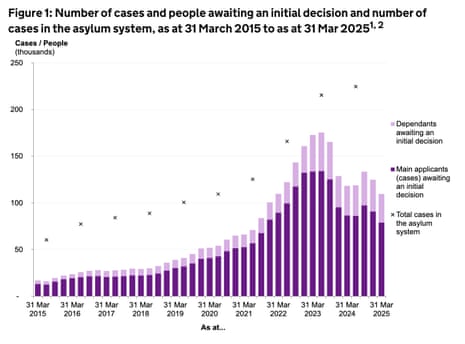
She also claimed that the “one in, one out” returns scheme with France about to come into force would make no difference to small boat arrival numbers. She said:
This is not going to make any difference whatsoever. 50, at best, migrants being swapped with France is not going to stop the boats.
The thing that would stop the boats was a deterrent. A Rwanda plan, which we had, processing people in a third country, and if they got asylum, keeping them there, is what would have stopped people trying to come to the UK to claim benefits.

Jeremy Corbyn warns new rules on council asset sales threaten allotments
Jeremy Corbyn has criticised Angela Rayner, the local government secretary, over changes that will allow councils to sell allotments to fund day-to-day spending, saying it “makes the future of these precious spaces even more perilous”, Jessica Murray reports.
50% of Reform UK supporters back Online Safety Act, despite party's pledge to repeal it, poll suggests
Priya Bharadia
Priya Bharadia is a Guardian reporter.
Some 59% of the British public support the Online Safety Act, with seven in ten (71%) saying they prioritise protecting children over free expression and privacy, according to polling by More in Common.
Reform UK voters are the most divided voter group about the legislation. But even though Nigel Farage, the party leader, has pledged to repeal the legislation, 50% of his supporters back the law, while 32% are opposed.
Meanwhile, 71% of Labour voters support the new measures, according to the poll.
Reform voters are also the most likely (25%) voter group to have a virtual private network (VPN) installed on their phone - which could allow the user to circumvent age verification online - compared to 18% of the wider British public.
However, seven in ten Britons are also worried about political content being restricted by social media companies under the law, rising to 83% among Reform voters.
Louis O’Geran, the research and communications associate at More in Common, said:
At first glance, the Online Safety Act looks like a public opinion win.
But beneath the headline support there are real concerns about how the policy will work in practice.
However, Britons think it is worth the trade offs to protect children – prioritising this over freedom of expression or online privacy.
Explore more on these topics

 3 weeks ago
3 weeks ago












